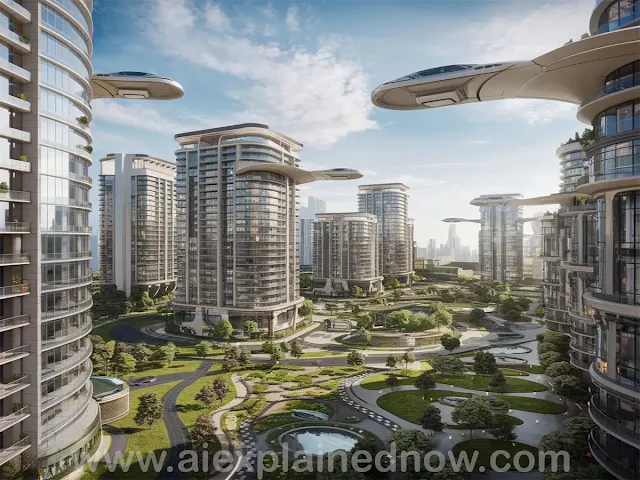How AI is Changing the Future of Smart Cities and Urban Planning
 |
| Discover How AI is Transforming Urban Living and Creating Smarter, More Sustainable Cities |
Artificial Intelligence (AI) is at the forefront of technological innovation, and its applications are reshaping industries worldwide. One area where AI is making a significant impact is in the development and management of smart cities. By enhancing urban planning processes, optimizing resources, and improving the quality of life for residents, AI is proving to be a game-changer. This blog explores how AI is revolutionizing the future of smart cities and urban planning.
The Role of AI in Shaping Smarter Cities and Revolutionizing Urban Planning
The Concept of Smart Cities
A smart city leverages digital technology and data to enhance urban living. It integrates systems like transportation, healthcare, public safety, utilities, and governance to make them more efficient and responsive. At the heart of this integration lies AI, which processes vast amounts of data to enable real-time decision-making and long-term strategic planning.
AI-Driven Urban Planning: Building Sustainable Cities
Urban planning is a complex process that involves balancing environmental sustainability, infrastructure needs, and population growth. AI is transforming this field by introducing predictive analytics, simulation tools, and automation.
1- Predictive Analytics for Future GrowthAI algorithms analyze historical and real-time data to predict urban growth patterns. These predictions help city planners design infrastructure that accommodates future needs, reducing the risk of overcrowding and resource depletion.
2- Simulations for Strategic Decision-MakingAI-powered tools simulate urban scenarios to test the impact of various planning decisions. For instance, planners can assess the effects of building new roads or green spaces on traffic flow, air quality, and community well-being before implementing changes.
3- Optimizing Land UseAI systems identify optimal land use by analyzing factors such as population density, economic activity, and environmental impact. This data-driven approach helps create balanced, multi-functional spaces that serve diverse community needs.
Smart Transportation: The Backbone of Urban Mobility
Transportation systems are a critical component of smart cities, and AI plays a pivotal role in modernizing them.1- Traffic Management
AI-powered traffic management systems use real-time data from sensors and cameras to optimize traffic flow. By predicting congestion and adjusting traffic signals accordingly, these systems reduce delays and improve road safety.
2- Public Transit OptimizationAI enhances public transit by analyzing usage patterns and recommending adjustments to routes, schedules, and fleet sizes. This ensures more efficient service and encourages greater use of public transportation.
3- Autonomous VehiclesSelf-driving cars and buses, powered by AI, are becoming a reality. These vehicles promise to reduce traffic accidents, lower emissions, and provide reliable transportation options for all, including those with mobility challenges.
AI and Environmental Sustainability
Smart cities prioritize sustainability, and AI contributes significantly to achieving environmental goals.1- Energy Efficiency
AI systems optimize energy consumption in buildings and public infrastructure by analyzing usage patterns and adjusting heating, cooling, and lighting systems in real-time. This reduces energy waste and lowers carbon footprints.
2- Waste ManagementAI-powered waste management solutions use sensors and data analytics to optimize collection routes and recycling processes. This not only improves efficiency but also promotes cleaner urban environments.
3- Air Quality MonitoringAI monitors air quality in real time, identifying pollution sources and predicting trends. This data helps policymakers implement targeted interventions to improve air quality.
Enhancing Public Safety with AI
Public safety is a top priority for urban planners, and AI-driven systems are proving invaluable in this area.1- Crime Prevention
AI analyzes crime data to predict potential hotspots and allocate law enforcement resources effectively. Additionally, facial recognition and surveillance technologies enhance security in public spaces.
2- Disaster ManagementAI helps cities prepare for and respond to natural disasters by analyzing weather patterns, predicting risks, and coordinating emergency response efforts. This capability saves lives and minimizes property damage.
Citizen Engagement: Creating Inclusive Communities
AI enables better communication between city authorities and residents, fostering inclusivity and collaboration.1- Digital Platforms for Feedback
AI-powered platforms collect and analyze citizen feedback to understand community needs and concerns. This data informs policies and projects that reflect residents' priorities.
2- Personalized ServicesAI tailors public services to individual needs, such as providing real-time updates on transportation or customizing healthcare recommendations.
Challenges and Ethical Considerations
While AI offers immense potential, its implementation in smart cities comes with challenges:1- Data Privacy and Security
The extensive use of data raises concerns about privacy and security. Cities must ensure robust cybersecurity measures and transparent data usage policies.
2- Algorithmic BiasAI systems may inadvertently perpetuate biases in decision-making. Addressing this issue requires diverse datasets and ongoing monitoring of AI algorithms.
3- AccessibilityEnsuring that AI-driven innovations benefit all residents, including underserved communities, is essential for equitable urban development.
Conclusion
AI is transforming smart cities and urban planning by making them more efficient, sustainable, and citizen-centric. From optimizing transportation systems to enhancing public safety and fostering community engagement, the possibilities are endless. However, realizing the full potential of AI requires addressing challenges like data security, bias, and inclusivity.
As urban populations continue to grow, AI's role in shaping the cities of the future will only become more critical. By leveraging AI responsibly, we can create smarter, greener, and more livable urban environments that benefit everyone.

